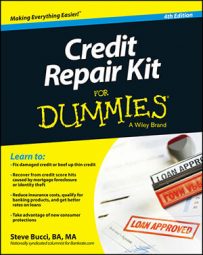In the event of a divorce, you need to think seriously about your credit. When the judge rules in your divorce decree, be sure that all joint debts are clearly and specifically assigned and that both you and your ex understand that these debts must be paid on time. Close all remaining joint accounts by the date on which the divorce is granted.
In the case of joint real estate that will eventually be sold, the party living on the property has more interest in making sure that the payments are made and should ask the judge to rule that the person in the house will send in the payments, even if the money comes from the other party.
A divorce decree doesn’t end either party’s responsibility for joint debts incurred, including individual debts in community-property states. The fact that the judge says only one of you has to make the payments from now on doesn’t change your contract with the lender. Each person is fully responsible for the entire balance of joint accounts, from credit cards to car loans to home mortgages.
How to overcome your ex’s defaults on your joint accounts
Given the stress associated with divorce, the fact that your ex may miss a payment or two is almost understandable. Although you may be understanding of such a mishap, keeping your credit record as clean as possible is critical in rebuilding a positive credit history as a single person.
Because you want to address any missed payments as soon as possible, you need to stay up-to-the-minute on payment status. You may find out about a delinquency in a number of ways: a letter, a phone call, a duplicate billing statement (you can request one), a website visit, or a credit monitoring service. As soon as you know that a payment wasn’t made, take action.
If your relationship allows, contact your ex to find out whether the bill has been paid. If trust is a concern or if your relationship precludes direct communication, let your lawyer handle it. Instruct your attorney to notify your ex’s attorney that the court order has been violated, and ask for a response.
If the situation isn’t resolved, you can always go back to court. You can ask the judge to reorder your ex to pay as agreed or face the not-so-pleasant legal consequences of contempt of court, which can include jail time. Returning to court to enforce the paying of assigned accounts is a lengthy and expensive course of action, so consider making the payments yourself.
By now you’ve probably figured out two things: Life isn’t fair, and paying a bill yourself may be easier than dealing with your ex and may be beneficial to you in the long run.
Repairing the damages
Credit damage from divorce isn’t unusual, but you can take the following steps to lessen the negative impact to your credit report and score:
Pay your bills on time. Paying on time adds positive credit history on top of any negative history. Over time, your credit score gives a large number of new, positive reports more weight than older negatives. As your credit report ages, older items count for less, so make the most of new credit going forward.
Add a 100-word statement to your credit report. Through this statement you can explain circumstances that a prospective lender or employer may not know about when considering your application.
Be careful not to leave this statement on your report longer than you need to, because it may draw attention to a past problem that’s no longer a factor in your credit score.
Review your credit reports frequently. Getting copies of your credit reports can help you control unexpected negatives, especially if your ex is still paying off joint or community-property debts. If your ex winds up not paying on a joint account, you’ll probably be subject to collection activity and have to pay, or you may end up in a different court.
You can pay for credit monitoring services that alert you to any negative entries as soon as they occur, allowing you to take immediate action to reduce the damage.
Get new credit in your own name
The first step in getting credit in your own name is to find out where your credit stands. Begin by obtaining your credit report and your FICO score or VantageScore. The national average score is around 675. If you’re at 780 or above, you’re in Super Prime territory!
If you have a good credit score
If your score is 675 or above, you probably have a good chance of getting new credit in a normal credit environment.
Credit standards tighten or loosen from time to time. In loose credit periods, a good score gets the job done. In a tight credit environment, a good score may not be enough to get the credit you want. Apply for the following in your own name; this diversity of credit helps you respond to most financial situations that arise and helps build your credit score with on-time payments:
Checking account
Savings account
Small installment loan
Retail store credit card
Major bank credit card
Library card (because it saves you money on books, videos, and more)
If you have a borderline credit score
If your score is 660 or lower, your journey toward establishing credit in your own name may be a bit slower. Begin with the following:
Checking account
Savings account
Passbook loan
Major bank credit card
Secured credit card
A secured card gives you a line of credit based on a savings deposit to secure the credit line. This card shows up on your credit report just like an unsecured card.
Retail store credit card
Library card

